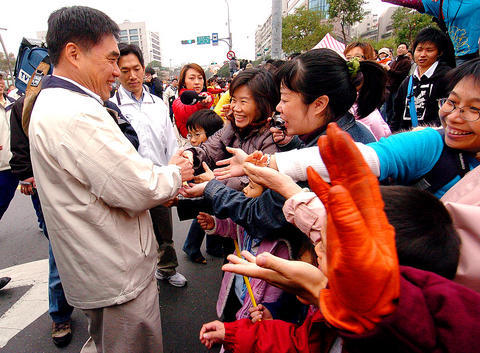Taipei Mayor Hau Lung-bin (郝龍斌) celebrated on Tuesday the first anniversary of his inauguration. However, rather than his municipal performance, most of the attention Hau has attracted over the past year has centered on his stances on a variety of issues in opposition to the central government.
From the streamlining of school textbooks, the tax redistribution fund, the permit for the government's UN bid torch relay, the renaming of National Taiwan Democracy Hall and the changing of the inscription on its main arch earlier this month, to recent disputes over the one-step or two-step voting procedure for next month's legislative election, Hau has seemingly gained a reputation among pan-blue supporters as the champion of the opposition camp in its ongoing confrontation with the central government.
Hau, 56, was born into a military family and is the son of former premier Hau Pei-tsun (

PHOTO: GEORGE TSORNG, TAIPEI TIMES
His insistence on carrying out a policy restricting the use of plastic bags and his resignation in protest at the holding of a referendum on the opening of the Taipei-Ilan highway linking Pinglin (坪林) and Shihding (石碇) gave the public a glimpse into his views.
Commenting on Hau's first year in office, Democratic Progressive Party (DPP) Taipei City Councilor Chou Po-ya (
"He should be more diplomatic and humble in his attitude, be more self-critical and communicate better with councilors," he said.
DPP Taipei City Councilor Wu Su-yao (
In May, when the Ministry of Education decided to rename Chiang Kai-shek Memorial Hall as Taiwan Democracy Memorial Hall, Hau expressed his firm opposition and threatened to arrest workers who removed the name plate.
His battle with the ministry continued as he criticized its multiple textbooks policy and insisted on standardizing textbooks in municipal schools.
This was followed by another dispute over the ministry's decision earlier this month to replace the plaque on the hall's main arch.
In his latest confrontation over the voting procedure, Hau vowed to adopt the two-step voting system in Taipei City and warned that "anyone who fails to follow the two-step voting procedure, including the president and all other politicians, will not be given ballots."
Liao Da-chi (廖達琪), a political science professor at National Chungshan University, said Hau should use his determination to improve the city.
"Being tough and persistent is not a bad thing, but he should take advantage of such characteristics in the pursuit of municipal development," she said.
Shih Cheng-feng (
While criticizing Hau for his poor performance as mayor -- accusations stemming in part from the continuous malfunction of the Maokong Gondola and the problematic management of the Taipei Arena -- DPP Taipei City Councilor Lee Wen-ying (
During the celebration of his first year anniversary last week, Hau acknowledged his administration's problematic relations with the central government, but blamed the latter for creating conflict.
"We have been in a passive position in our disputes with the central government. The city government does not stir up trouble. However, we will continue to fight for our rights in line with the law," he was quoted as saying at the press conference.
KMT Taipei City Councilor Chen Yu-mei (
Independent Taipei City Councilor Chien Yu-yen (
"Hopefully Hau will emerge from Ma's shadow and become an independent mayor," she said.

Palauan President Surangel Whipps Jr arrived in Taiwan last night to kick off his first visit to the country since beginning his second term earlier this year. After arriving at Taoyuan International Airport at around 6:30 pm, Whipps and his delegation were welcomed by Minister of Foreign Affairs Lin Chia-lung (林佳龍). Speaking to gathered media, the Palauan leader said he was excited and honored to be back in Taiwan on his first state visit to Taiwan since he was sworn in this January. Among those traveling with Whipps is Minister of State Gustav N. Aitaro, Public Infrastructure

President William Lai (賴清德) yesterday thanked Palau for its continued support of Taiwan's international participation, as Taipei was once again excluded from the World Health Assembly (WHA) currently taking place in Switzerland. "Palau has never stopped voicing support for Taiwan" in the UN General Assembly, the WHO and other UN-affiliated agencies, Lai said during a bilateral meeting with visiting Palau President Surangel Whipps Jr. "We have been profoundly touched by these endorsements," Lai said, praising the Pacific island nation's firm support as "courageous." Lai's remarks came as Taiwan was excluded for the ninth consecutive year from the WHA, which is being held in

RESOLUTIONS DEBATE: Taiwan’s allies said that UN and WHA resolutions cited by China and other nations ‘do not determine Taiwan’s participation in WHO activities’ A proposal to invite Taiwan to this year’s World Health Assembly (WHA) was rejected on Monday, resulting in Taipei’s absence from the annual meeting for a ninth consecutive year, although partners spoke up for Taiwan’s participation at the first day of the meeting. The first agenda item after the opening was a “two-on-two debate” on a proposal to invite Taiwan to participate at the WHA as an observer. Similar to previous years, two countries made statements in favor of the proposal, while two others expressed their opposition. Philippine Secretary of Health Teodoro Herbosa, president of the 78th WHA, accepted the WHA General Committee’s

At least three people died and more than a dozen were injured yesterday afternoon when a vehicle struck a group of pedestrians in New Taipei City’s Sansia District (三峽). The incident happened at about 4pm when a car rammed into pedestrians at an intersection near Bei Da Elementary School. Witnesses said the sedan, being driven at a high speed, ran a red light, knocking scooters out of the way and hitting students crossing the road before careening into a median near the intersection of Guocheng and Guoguang streets. The incident resulted in three deaths and 13 injuries, including the driver, a 78-year-old man